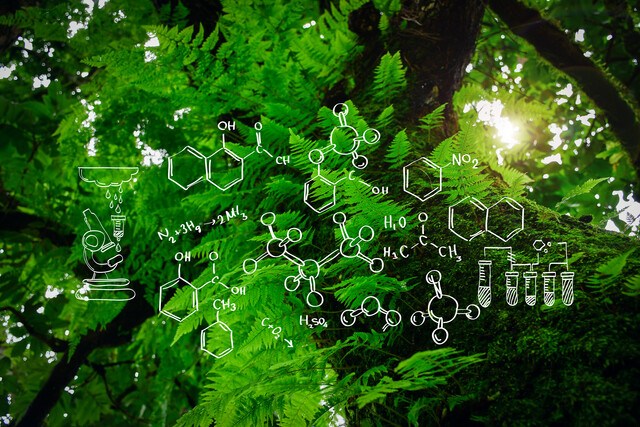Online Class: The Power of Ecology — Shaping a Sustainable Future

-
20Lessons
-
28Exams &
Assignments -
14Hours
average time -
1.4CEUs
Course Description
Have you ever wondered how life on Earth weaves together into an intricate, beautiful, yet fragile tapestry? Every living organism, every ecosystem, every natural process is part of a profound story-one that shapes not just our environment, but the very future of humanity. If you're ready to move beyond curiosity and become part of the solution to today's most pressing environmental challenges, this course is your gateway.
Our world is changing at an unprecedented pace. Ecosystems are under strain, biodiversity is in peril, and the balance that sustains life is shifting. But within these challenges lies an incredible opportunity-the chance to understand, protect, and even restore the delicate systems that make life on Earth possible. That's what ecology is all about: understanding the connections, deciphering the patterns, and taking action. This course will empower you with the knowledge and skills to make that difference.
Unlike traditional science courses, this isn't about memorizing facts or passively learning theories. It's about immersing yourself in the fascinating story of life on Earth. You'll delve into the dynamic relationships between species, explore how ecosystems function, and uncover the powerful forces that have shaped life over millions of years. From the smallest microbe to the largest mammal, every element has a role-and you'll learn how to uncover those connections and apply that understanding in meaningful ways.
But this course goes further. It's not just about gaining knowledge; it's about transforming how you see the world. You'll explore groundbreaking topics like evolutionary ecology, biogeography, and systems ecology, gaining insights into the processes that govern our planet. You'll discover how cutting-edge tools like Geographic Information Systems (GIS) are revolutionizing our ability to map and protect biodiversity. And you'll walk away with practical skills for managing natural resources, combating biodiversity loss, and driving sustainable solutions.
Whether you're an aspiring environmental scientist, a passionate advocate for sustainability, or simply someone who wants to make a real impact, this course is your springboard. It's designed to inspire, challenge, and equip you to think critically and act decisively in a world that needs knowledgeable, compassionate stewards now more than ever.
This is more than a class-it's a call to action. Are you ready to explore, understand, and safeguard the Earth's most precious systems? The time to act is now. Join us, and be the change our planet so urgently needs.
Course Lessons
Lesson 1. Ecology Unveiled: From Microorganisms to Megafauna
 Lesson 1 Video
Lesson 1 Video Review Practice Worksheet: Lesson-1-WordSearch-11903.pdf
Review Practice Worksheet: Lesson-1-WordSearch-11903.pdf Lesson discussions: Reasons for Taking this Course
Lesson discussions: Reasons for Taking this Course Complete Assignment: An Introduction
Complete Assignment: An Introduction Assessment: Lesson 1 Exam
Assessment: Lesson 1 Exam
Lesson 2. Life's Relationships: An Ecology Overview
 Lesson 2 Video
Lesson 2 Video Review Practice Worksheet: Lesson-2-Downloadable-11904.pdf
Review Practice Worksheet: Lesson-2-Downloadable-11904.pdf Assessment: Lesson 2 Exam
Assessment: Lesson 2 Exam
Lesson 3. Dance of Nature: Ecology and Evolution
 Review Practice Worksheet: Lesson-3-WorkSheet-11905.pdf
Review Practice Worksheet: Lesson-3-WorkSheet-11905.pdf Complete: Lesson 3 Activity
Complete: Lesson 3 Activity Assessment: Lesson 3 Exam
Assessment: Lesson 3 Exam
Lesson 4. Ecological and Evolutionary Synergy
 Lesson 4 Video
Lesson 4 Video Review Practice Worksheet: Lesson-4-WorkSheet-11906.pdf
Review Practice Worksheet: Lesson-4-WorkSheet-11906.pdf Complete: Lesson 4 Activity
Complete: Lesson 4 Activity Assessment: Lesson 4 Exam
Assessment: Lesson 4 Exam
Lesson 5. Within and Between: Exploring Relationships in Ecology
 Lesson 5 Video
Lesson 5 Video Review Practice Worksheet: Lesson-5-Downloadable-11907.pdf
Review Practice Worksheet: Lesson-5-Downloadable-11907.pdf Assessment: Lesson 5 Exam
Assessment: Lesson 5 Exam
Lesson 6. Biodiversity: Earth's Essential Tapestry
 Lesson 6 Video
Lesson 6 Video Review Practice Worksheet: Lesson-6-HomeWork-11908.pdf
Review Practice Worksheet: Lesson-6-HomeWork-11908.pdf Complete: Lesson 6 Activity
Complete: Lesson 6 Activity Assessment: Lesson 6 Exam
Assessment: Lesson 6 Exam
Lesson 7. The Dynamics of Extinction and Evolution
 Lesson 7 Video
Lesson 7 Video Review Practice Worksheet: Lesson-7-Activity-11909.pdf
Review Practice Worksheet: Lesson-7-Activity-11909.pdf Complete: Lesson 7 Activity
Complete: Lesson 7 Activity Assessment: Lesson 7 Exam
Assessment: Lesson 7 Exam
Lesson 8. The Intricate Web of Life on Earth: Understanding Our Biodiverse Planet
 Lesson 8 Video
Lesson 8 Video Review Practice Worksheet: Lesson-8-WorkSheet-11910.pdf
Review Practice Worksheet: Lesson-8-WorkSheet-11910.pdf Complete: Lesson 8 Activity
Complete: Lesson 8 Activity Assessment: Lesson 8 Exam
Assessment: Lesson 8 Exam
Lesson 9. Wallace's Legacy: The Evolution and Impact of Biogeographical Science
 Lesson 9 Video
Lesson 9 Video Review Practice Worksheet: Lesson-9-Activity-11911.pdf
Review Practice Worksheet: Lesson-9-Activity-11911.pdf Assessment: Lesson 9 Exam
Assessment: Lesson 9 Exam
Lesson 10. Advanced Technologies in Biogeography: The Role of GIS and Remote Sensing
 Lesson 10 Video
Lesson 10 Video Review Practice Worksheet: Lesson-10-Activity-11912.pdf
Review Practice Worksheet: Lesson-10-Activity-11912.pdf Assessment: Lesson 10 Exam
Assessment: Lesson 10 Exam
Lesson 11. Spatial Patterns and Processes in Ecology
 Lesson 11 Video
Lesson 11 Video Review Practice Worksheet: Lesson-11-Downloadable-11913.pdf
Review Practice Worksheet: Lesson-11-Downloadable-11913.pdf Complete: Lesson 11 Activity
Complete: Lesson 11 Activity Assessment: Lesson 11 Exam
Assessment: Lesson 11 Exam
Lesson 12. The Conservation Implications of Population Dynamics
 Lesson 12 Video
Lesson 12 Video Review Practice Worksheet: Lesson-12-WorkSheet-11914.pdf
Review Practice Worksheet: Lesson-12-WorkSheet-11914.pdf Assessment: Lesson 12 Exam
Assessment: Lesson 12 Exam
Lesson 13. Community Ecology: A Guide to Nature's Relationships
 Lesson 13 Video
Lesson 13 Video Review Practice Worksheet: Lesson-13-Activity-11915.pdf
Review Practice Worksheet: Lesson-13-Activity-11915.pdf Assessment: Lesson 13 Exam
Assessment: Lesson 13 Exam
Lesson 14. Physiological Ecology's Insights for Conservation and Adaptation
 Lesson 14 Video
Lesson 14 Video Review Practice Worksheet: Lesson-14-WorkSheet-11916.pdf
Review Practice Worksheet: Lesson-14-WorkSheet-11916.pdf Assessment: Lesson 14 Exam
Assessment: Lesson 14 Exam
Lesson 15. Ecosystem Dynamics and Interactions
 Lesson 15 Video
Lesson 15 Video Review Practice Worksheet: Lesson-15-Activity-11917.pdf
Review Practice Worksheet: Lesson-15-Activity-11917.pdf Assessment: Lesson 15 Exam
Assessment: Lesson 15 Exam
Lesson 16. The Interconnected Web of Ecology: Bridging Energetics and Ecosystems
 Lesson 16 Video
Lesson 16 Video Review Practice Worksheet: Lesson-16-HomeWork-11918.pdf
Review Practice Worksheet: Lesson-16-HomeWork-11918.pdf Assessment: Lesson 16 Exam
Assessment: Lesson 16 Exam
Lesson 17. Understanding the Vital Role of Plant Ecology in Sustaining Terrestrial Life
 Lesson 17 Video
Lesson 17 Video Review Practice Worksheet: Lesson-17-Activity-11919.pdf
Review Practice Worksheet: Lesson-17-Activity-11919.pdf Assessment: Lesson 17 Exam
Assessment: Lesson 17 Exam
Lesson 18. Nature's Symbiosis: A Comprehensive Guide to Animal Interactions
 Lesson 18 Video
Lesson 18 Video Review Practice Worksheet: Lesson-18-WordSearch-11920.pdf
Review Practice Worksheet: Lesson-18-WordSearch-11920.pdf Assessment: Lesson 18 Exam
Assessment: Lesson 18 Exam
Lesson 19. Human Ecology: The Intersection of Society and Environment
 Lesson 19 Video
Lesson 19 Video Review Practice Worksheet: Lesson-19-HomeWork-11921.pdf
Review Practice Worksheet: Lesson-19-HomeWork-11921.pdf Assessment: Lesson 19 Exam
Assessment: Lesson 19 Exam
Lesson 20. Guardians of Nature: Redefining Humanity's Role in Ecological Conservation
 Lesson 20 Video
Lesson 20 Video Review Practice Worksheet: Lesson-20-HomeWork-11922.pdf
Review Practice Worksheet: Lesson-20-HomeWork-11922.pdf Lesson discussions: End of Course Poll; Course Comments; Course Comments
Lesson discussions: End of Course Poll; Course Comments; Course Comments Assessment: Lesson 20 Exam
Assessment: Lesson 20 Exam Assessment: The Final Exam
Assessment: The Final Exam
Learning Outcomes
- Define the concept of ecology as the scientific study of interactions among organisms and their environments, distinguishing it from environmentalism as an advocacy movement.
- Describe the historical evolution of ecological thought, identifying key figures and contributions that have shaped modern ecological studies and their impact on environmental policy.
- Define abiotic and biotic factors in an ecosystem and provide examples of each within different environmental contexts.
- Identify at least three human activities that impact ecological balance and explain their effects on ecosystems.
- Analyze the impact of environmental changes on speciation by illustrating different forms of speciation like allopatric and sympatric through real-world examples.
- Define the concept of natural selection and describe its role in the evolution of species by analyzing examples such as Galápagos finches and peppered moths.
- Identify and explain the life history strategies of organisms by comparing r-strategy and K-strategy examples, such as sea turtles and elephants.
- Define the concept of ecotypes and describe their role in species adaptation to local habitats, using examples to illustrate genetic variation and conservation importance.
- Identify and analyze examples of polymorphism and industrial melanism in various species, evaluating rapid evolutionary changes in response to environmental pressures.
- Describe the different types of symbiotic relationships in ecosystems, including mutualism, commensalism, and parasitism, through real-world examples.
- Identify and analyze adaptive strategies in predator-prey dynamics and their impact on population balance and ecosystem health.
- Define the three levels of biodiversity: ecosystem diversity, species diversity, and genetic diversity, and provide examples of each within a given ecosystem.
- Describe the impact of human activities on biodiversity, including habitat destruction, climate change, pollution, overexploitation, and invasive species, and propose conservation strategies to mitigate these effects.
- Demonstrate mastery of lesson content at levels of 70% or higher.
Additional Course Information

- Document Your Lifelong Learning Achievements
- Earn an Official Certificate Documenting Course Hours and CEUs
- Verify Your Certificate with a Unique Serial Number Online
- View and Share Your Certificate Online or Download/Print as PDF
- Display Your Certificate on Your Resume and Promote Your Achievements Using Social Media

Student Testimonials
- "Again, wonderful course, very interesting, covered a lot of subject matter, and I learned a lot. Thank you!" -- Kathleen S.
- "The instructor obviously was an expert, and she truly seemed to enjoy her work as an instructor." -- Judith J.
- "The reviews of each part of ecology really helped me categorize and will allow me to respond quicker to my students' questions." -- James S.
- "I enjoyed the course and instructor. Most everything was helpful." -- Joel H.






